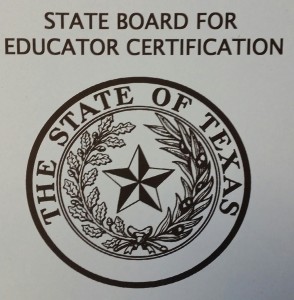SBEC gives initial approval to weakened abbreviated educator preparation program

Educator Preparation | Certification
Date Posted: 5/18/2018
 The State Board for Educator Certification (SBEC) is meeting today in Austin. The board spent significant time this morning on a proposal to create an abbreviated path to the Trade and Industrial Workforce Training certificate. As the board received word of the heartbreaking news regarding a school shooting developing in Santa Fe ISD, members held a moment of silence and broke for a fifteen minute recess.
The State Board for Educator Certification (SBEC) is meeting today in Austin. The board spent significant time this morning on a proposal to create an abbreviated path to the Trade and Industrial Workforce Training certificate. As the board received word of the heartbreaking news regarding a school shooting developing in Santa Fe ISD, members held a moment of silence and broke for a fifteen minute recess.
The abbreviated educator preparation and training program for candidates seeking the Trade and Industrial Workforce Training certificate was codified into law by HB 3349, a bill by Representative Gervin-Hawkins, during the 85th Legislature last year. The law requires SBEC to implement the new abbreviated pathway. The board has seen and discussed the proposal for its past two meetings, but the proposal the board saw today was a vastly different version based on input from the bill’s author and others out of the San Antonio area. ATPE and other educator groups were not a part of that stakeholder group that singularly drove the changes. Today, ATPE joined a chorus of stakeholders from the education community in opposing the changes.  Stressing the board’s recent focus on raising standards for teacher training in Texas, ATPE highlighted three major changes under the new proposal that are of concern:
Stressing the board’s recent focus on raising standards for teacher training in Texas, ATPE highlighted three major changes under the new proposal that are of concern:
- It expands the abbreviated program path to the Marketing and Health Science certificates. These are not included in the bill and were not discussed by legislators as desired abbreviated pathways.
- It reduces the number of training hours required before the candidate enters the classroom as the teacher-or-record from 180 to 110. While trade and industrial workforce career individuals bring valuable subject matter expertise to the classroom, they lack the training required to ensure they understand the science behind teaching that subject matter to a child. ATPE sees no reason these candidates should receive less pre-service training than other teacher candidates.
- It allows entities other than approved EPPs to provide the remaining 90 hours of training, which is again outside the bounds of the bill and, further, calls into question who is responsible for, approved for, and accountable to training educators.
Rep. Gervin-Hawkins was the only attendee present at the board meeting expressing support for the new trade and industrial workforce training proposal. All four teacher organizations and testimony from a classroom teacher shared the concerns expressed above by ATPE. Teacher board member Suzanne McCall was the only board member to oppose the new proposal. She highlighted testimony from the fourth grade Texas teacher who sees too many of her fellow teachers enter the classroom ill-prepared and watches them struggle. McCall stressed the importance of the foundational knowledge teachers receive before entering the classroom, and reminded the board that teacher pre-service training entails important exposure to things like how to teacher students with special needs. Her attempts to improve the proposal through amendments failed to receive any support from her fellow board members.
Many of the remaining board members seemed poised from the beginning to support the new proposal. Several members seemed unconcerned that these teacher candidates would receive less training than other teachers prior to entering the classroom as the sole teacher responsible for the students of a classroom. Superintendent member Dr. Susan Hull said these candidates don’t need more than 110 hours of training, which equates to roughly 3 weeks. Citizen member Leon Leal said we are disrespecting the career knowledge these candidates bring by expecting them to have the same amount of pre-service training as other teachers. There was interest from superintendent member Dr. Cavazos in removing the addition of the Marketing and Health Science certificates, but he ultimately only expressed concern and chose not to offer an amendment to remove them. Other members of the board advocated for the added certificates. The board’s action today granted only initial approval to the proposal.
The board also gave initial approval to proposals pertaining to the Educators’ Code of Ethics and educator discipline. At the board’s previous meeting in March, ATPE engaged with the board over a proposal to amend the Educators’ Code of Ethics. Texas Education Agency (TEA) staff at that time was looking to add several items that ATPE, other stakeholders, and board members felt didn’t belong because they weaken the Educators’ Code of Ethics and the high regard to which it should be held. Board members asked TEA to come back to them with more appropriate revisions. ATPE and other stakeholders worked with the staff to revise the text and was ultimately successful at moving a key piece of concern to the disciplinary chapter, where it is more appropriately housed.
The board will be back to consider the above items for final adoption at the August 3 meeting.
CONVERSATION
RECOMMENDED FOR YOU

06/30/2025
Recap of the June 2025 SBOE Meeting
The Texas State Board of Education (SBOE) met June 24–27, 2025, in Austin.

06/27/2025
Teach the Vote’s Week in Review: June 27, 2025
Gov. Abbott calls a special session to begin July 21, and a federal voucher proposal faces an uphill battle.

06/25/2025
Commissioner of education shares updates with State Board of Education
Commissioner Mike Morath’s June 25 remarks to SBOE members covered STAAR, charter recommendations, and legislative updates.

